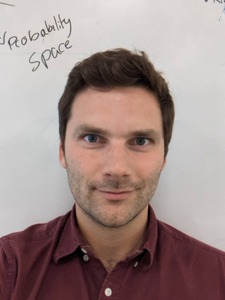Mark van der Wilk

Mark van der Wilk
Department of Computer Science,
Parks Road 14/15,
Room PR-40.06
Directions Postal Address
Interests
Together with my research group, I work on three central questions:
- How do we find general patterns that allow generalization beyond the training set, without humans manually encoding them? (Equivariance, causality, continual learning…)
- How can we create neurons that automatically assemble their connectivity structure (architecture), while minimising the computational costs of the network as a whole? (Generalisation bounds, Bayesian model selection, MDL, meta-learning)
- How do we interact with the environment, while avoiding risk but learning as quickly as possible? (Bayesian optimisation, foundation models for industrial applications e.g. chemistry)
The hope is that answering these questions will lead to ML/AI methods that make better predictions with less technical input from humans. I collaborate with practitioners in science and industry to apply these methods in science and engineering applications (e.g. in bioengineering and chemistry).
Longer term, I believe that new training algorithms may open doors to more energy-efficient methods, that are more suitable for future hardware architectures, which often favour local communication patterns.
I am also exploring ways in which AI systems can make it easier for humans to share information, and build consensus, to make collaboration easier.
See my personal webpage or research overview for more information.
Biography
I am an Associate Professor in the Department of Computer Science at the University of Oxford, where I run a research group working on a range of topics in machine learning. I am particularly interested in how to automatically discover good inductive biases to improve decision making with small amounts of data. I collaborate with industry, start-ups, and other scientists to practically apply these methods. Before starting at Oxford, I spent 4 years as an assistant and associate professor at Imperial College London. I completed my PhD at the University of Cambridge in 2017.
Selected Publications
-
Learning Layer−wise Equivariances Automatically using Gradients
Tycho F. A. van der Ouderaa‚ Alexander Immer and Mark van der Wilk
In Advances in Neural Information Processing Systems (NeurIPS). Vol. 36. December, 2023.
Details about Learning Layer−wise Equivariances Automatically using Gradients | BibTeX data for Learning Layer−wise Equivariances Automatically using Gradients
-
Competitive Amplification Networks enable molecular pattern recognition with PCR
John P Goertz‚ Ruby Sedgwick‚ Francesca Smith‚ Myrsini Kaforou‚ Victoria J Wright‚ Jethro A. Herberg‚ Zsofia Kote−Jarai‚ Ros Eeles‚ Mike Levin‚ Ruth Misener‚ Mark van der Wilk and Molly M Stevens
In bioRxiv. 2023.
Details about Competitive Amplification Networks enable molecular pattern recognition with PCR | BibTeX data for Competitive Amplification Networks enable molecular pattern recognition with PCR | DOI (10.1101/2023.06.29.546934) | Link to Competitive Amplification Networks enable molecular pattern recognition with PCR
-
Combining multi−fidelity modelling and asynchronous batch Bayesian Optimization
Jose Pablo Folch‚ Robert M. Lee‚ Behrang Shafei‚ David Walz‚ Calvin Tsay‚ Mark van der Wilk and Ruth Misener
In Computers & Chemical Engineering. Vol. 172. 2023.
Details about Combining multi−fidelity modelling and asynchronous batch Bayesian Optimization | BibTeX data for Combining multi−fidelity modelling and asynchronous batch Bayesian Optimization | DOI (https://doi.org/10.1016/j.compchemeng.2023.108194) | Link to Combining multi−fidelity modelling and asynchronous batch Bayesian Optimization
